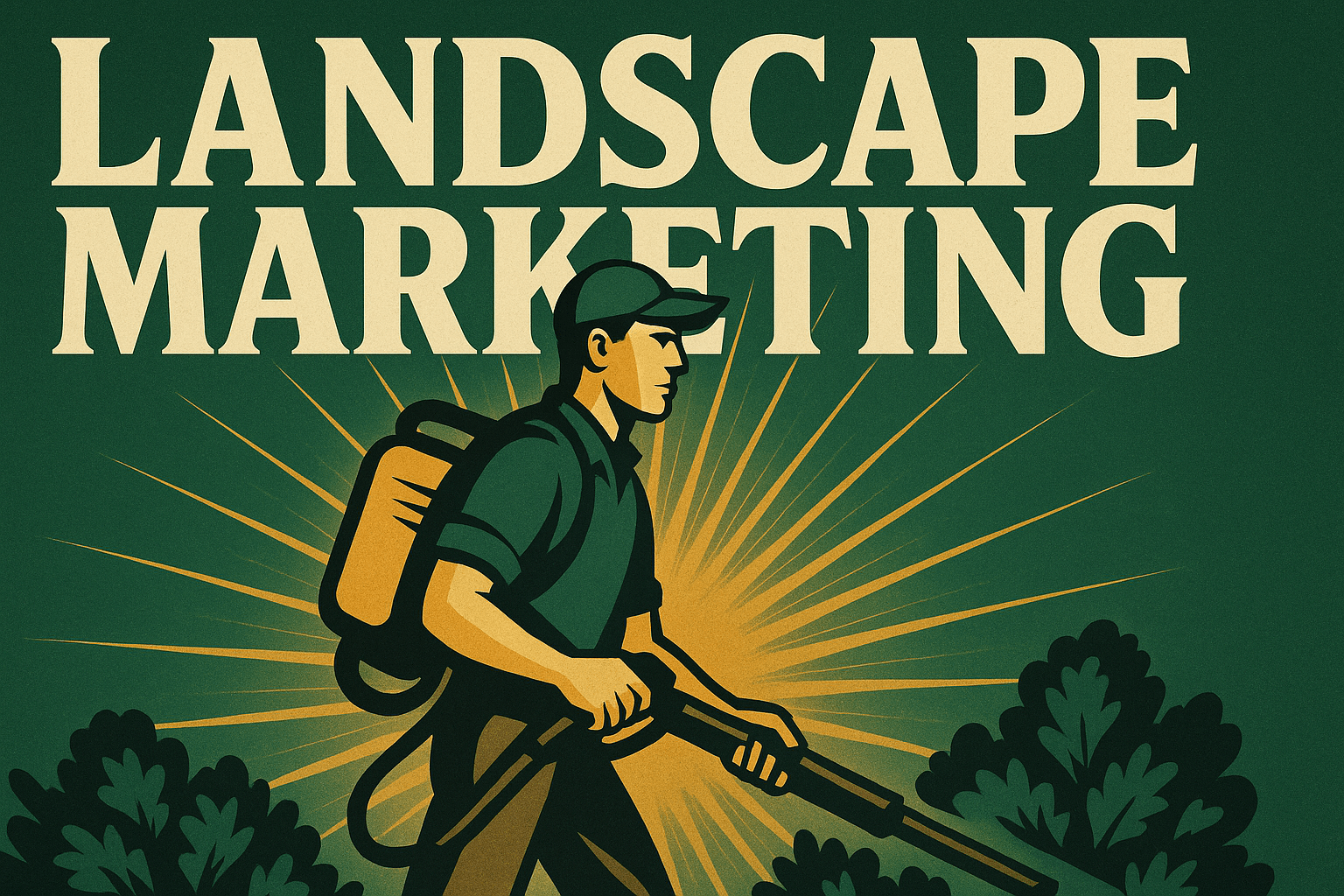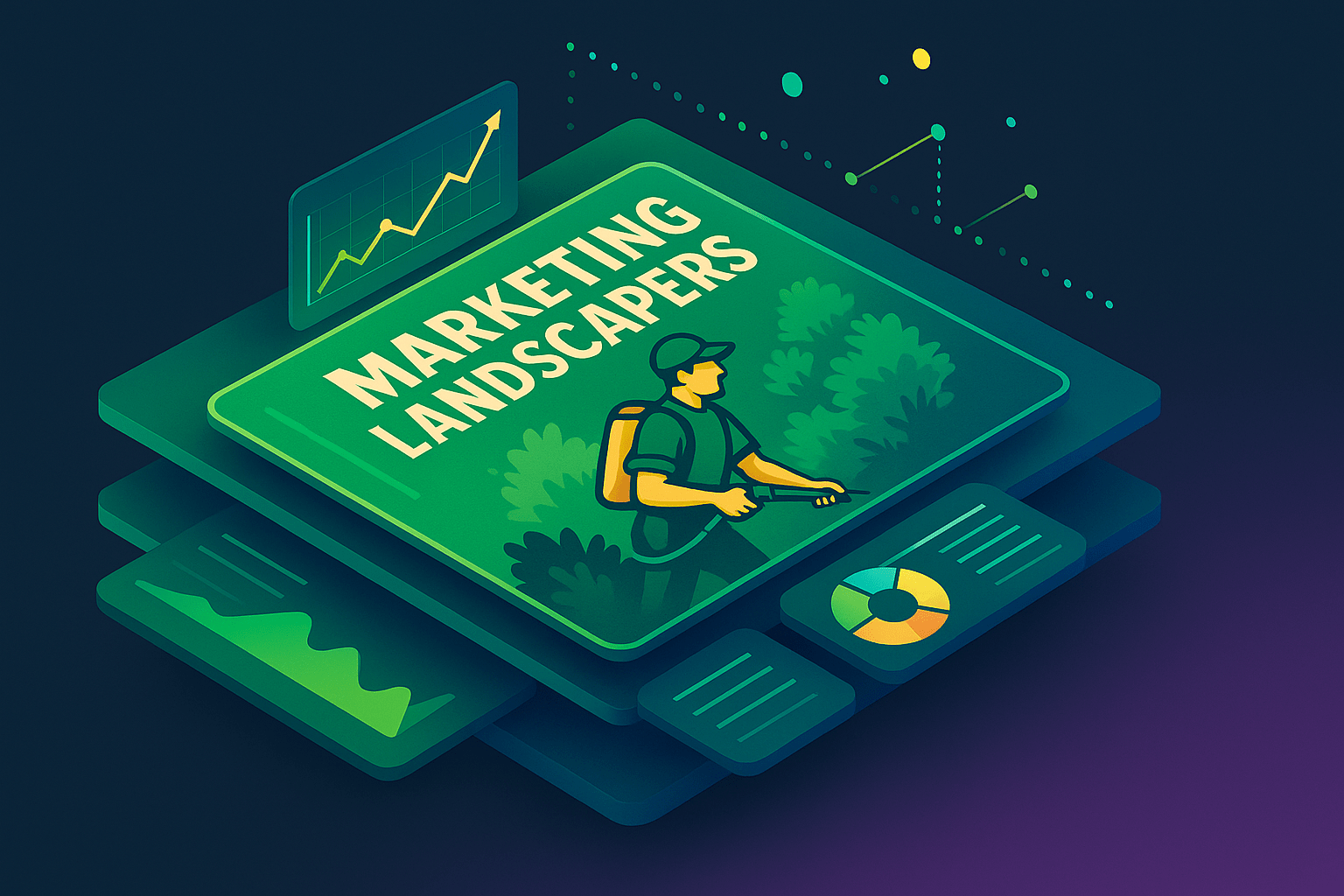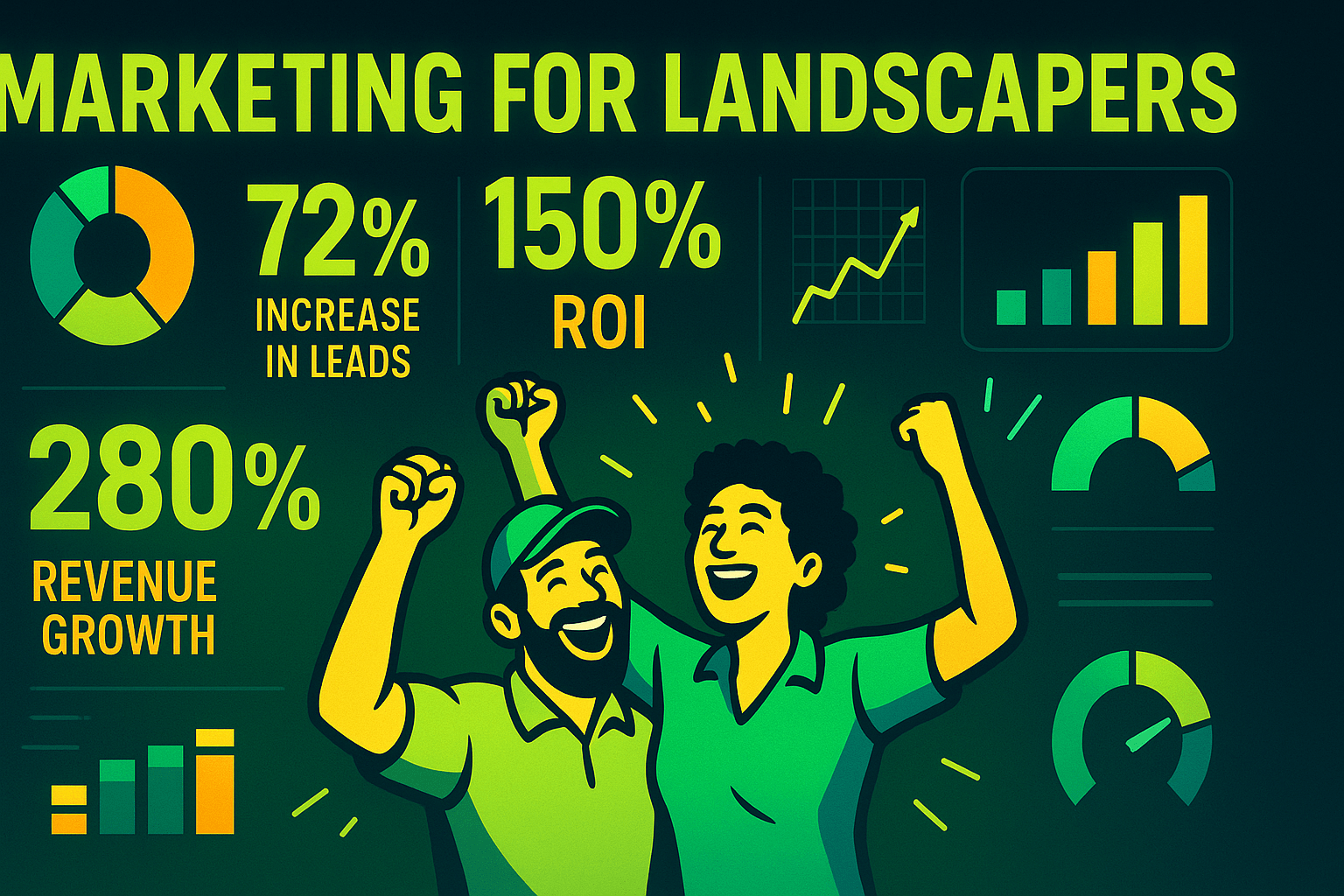Marketing for Landscapers: Proven Strategies to Attract More Clients & Grow Revenue in 2026
by Design Delulu Editorial · October 21, 2025

Smart, fast, and measurable. Here's how marketing helps Landscapers win.
In the landscaping industry, word-of-mouth and seasonal referrals once drove the majority of new business. But today's customers research contractors online before making contact, compare portfolios on Instagram, and read reviews before committing to estimates. If your landscaping company isn't visible where buyers are looking, you're leaving revenue on the table — and competitors with smarter marketing strategies are capturing those high-value projects.
Marketing for landscapers isn't about random social posts or outdated Yellow Pages ads. It's about strategic visibility, trust-building content, and conversion-focused campaigns that turn searchers into booked jobs. Whether you specialize in residential lawn care, commercial property maintenance, hardscaping, or landscape design, the right marketing approach helps you attract ideal clients, showcase your expertise, and build a predictable pipeline that keeps crews busy year-round.

Why Marketing Matters for Landscaping Businesses
The landscaping market is fiercely competitive, with over 600,000 landscaping businesses operating across the United States. Homeowners and commercial property managers have countless options, which means differentiation isn't optional — it's survival. Marketing gives you the tools to stand out, communicate value before the first conversation, and position your company as the trusted choice in your service area.
Traditional methods like door hangers and truck signage still have a role, but they can't compete with the reach and precision of digital marketing. Modern buyers expect to find you online, see proof of your work, and verify your reputation through reviews. When you invest in marketing that meets customers where they are, you gain three critical advantages:
- Predictable lead generation: Instead of relying on seasonal fluctuations or referrals, strategic marketing creates consistent inbound interest, helping you forecast revenue and schedule work more effectively.
- Higher-quality clients: Educated prospects who've reviewed your portfolio and understand your process arrive ready to move forward, reducing quote-to-close time and minimizing tire-kickers.
- Scalable growth: Marketing systems that work can be optimized and expanded, allowing you to enter new service areas, add crews, and increase average project values without proportional increases in acquisition costs.
The landscapers who dominate their markets aren't necessarily the biggest operations — they're the ones who consistently show up in search results, maintain active social channels with fresh project photos, and nurture relationships through email campaigns that educate and engage. Marketing is the multiplier that turns solid work into sustainable business growth.
Core Components of Effective Landscaper Marketing
A comprehensive marketing strategy for landscapers combines multiple channels and tactics, each serving a specific purpose in the customer journey. The most successful campaigns integrate these elements into a cohesive system where every piece reinforces the others, building momentum over time.
Search Engine Optimization (SEO) for Local Visibility
When someone searches 'landscaping services near me' or 'lawn care in [your city],' your goal is simple: appear in the top three local results. That visibility window captures the majority of clicks and dramatically increases the likelihood of winning the business. Local SEO ensures your company shows up when intent is highest.
Key SEO priorities for landscapers:
- Google Business Profile optimization: Complete every field, upload high-quality project photos weekly, respond to all reviews, and post regular updates about seasonal services or completed projects.
- Location-specific landing pages: Create dedicated pages for each service area you cover, with unique content addressing that community's landscaping needs and climate considerations.
- Service-focused content: Build separate pages for core offerings like lawn maintenance, irrigation installation, hardscaping, tree services, and landscape design — each optimized for relevant search terms.
- Technical foundations: Ensure your website loads quickly, works flawlessly on mobile devices, includes schema markup for local business data, and has a clear site structure that search engines can easily crawl.
SEO is a long game, but the payoff is substantial. Organic search traffic costs nothing per click, targets users actively looking for your services, and builds compounding value over time as your domain authority grows.
Content Marketing That Educates and Converts
Educational content positions your landscaping company as the knowledgeable expert, building trust before prospects ever contact you. When potential clients find helpful, detailed information on your website or social channels, you move from vendor to advisor — a powerful shift that shortens sales cycles and increases close rates.
High-impact content formats for landscapers:
- Project showcases: Before-and-after galleries with detailed descriptions of challenges faced, solutions implemented, and results achieved. Include budget ranges when possible to pre-qualify leads.
- Seasonal guides: 'Spring Lawn Care Checklist,' 'Fall Cleanup Timeline,' or 'Winter Property Maintenance Tips' articles that provide genuine value while subtly positioning your services as the solution.
- Service explainers: Detailed posts about 'What to Expect During a Landscape Design Process' or 'How Professional Irrigation Systems Save Water and Money' that address common questions and objections.
- Video content: Time-lapse project videos, crew spotlights, equipment demonstrations, and quick tips perform exceptionally well on social media and can be repurposed across multiple platforms.
Effective content marketing for landscapers isn't about publishing constantly — it's about creating genuinely useful resources that your ideal clients actually want to consume and share. Quality over quantity wins every time.
Social Media Strategy for Visual Storytelling
Landscaping is inherently visual, making platforms like Instagram, Facebook, and Pinterest ideal channels for showcasing your work. Social media serves dual purposes: attracting new prospects through beautiful imagery and nurturing existing relationships through regular engagement.
Social media best practices for landscaping companies:
- Document every project: Take progress photos throughout the workday, capturing dramatic transformations that highlight your team's skill and attention to detail.
- Mix content types: Alternate between finished project photos, in-progress shots, team spotlights, client testimonials, seasonal tips, and behind-the-scenes content that humanizes your brand.
- Engage authentically: Respond to comments and messages promptly, participate in local community groups, and interact with complementary businesses like real estate agents and architects.
- Use platform features: Leverage Instagram Stories for real-time updates, Facebook Events for seasonal promotions, and Pinterest boards organized by service type to capture users in research mode.
Consistency matters more than perfection. A steady stream of quality content beats sporadic excellence, so establish a realistic posting schedule and stick to it.
Email Marketing for Client Retention and Referrals
Acquiring new customers costs significantly more than retaining existing ones, yet many landscapers neglect email marketing — one of the highest-ROI channels available. Strategic email campaigns keep your company top-of-mind, encourage repeat business, and generate referrals from satisfied clients.
Essential email campaigns for landscapers:
- Seasonal reminders: Alert clients when it's time for spring cleanup, fall aeration, winterization services, or other time-sensitive maintenance that protects their investment.
- Project recaps: Send a summary with photos after completing work, reinforcing the value delivered and prompting reviews or referrals.
- Educational series: Share lawn care tips, pest identification guides, or landscape design trends that position you as a helpful resource beyond just service delivery.
- Special offers: Reward loyal customers with exclusive discounts, early booking incentives, or referral bonuses that encourage them to spread the word.
Build your email list aggressively by offering lead magnets (free lawn care guides, seasonal checklists) and collecting contacts at every customer interaction. A robust list is a business asset that appreciates over time.

Building a Marketing System That Scales
Individual tactics generate results, but integrated systems create competitive advantages. The most effective marketing for landscapers follows a repeatable framework that can be optimized, automated, and scaled as your business grows.
The Four-Phase Marketing Framework
This proven approach ensures every marketing dollar drives measurable results while building long-term brand equity:
- Discovery & Goals: Start by clarifying your business objectives, identifying your ideal client profile, analyzing competitor positioning, and establishing success metrics tied directly to revenue. Are you focused on residential or commercial work? What's your average project value? Which services generate the highest margins? Clarity here determines everything downstream.
- Blueprint: Design an integrated marketing strategy that connects the dots between awareness, consideration, and conversion. Map out content themes, channel priorities, budget allocation, and attribution models. This blueprint becomes your roadmap, ensuring every campaign aligns with broader business goals rather than operating in isolation.
- Build & Launch: Execute the plan with meticulous attention to implementation details. Set up tracking infrastructure, create campaign assets, configure automation workflows, and establish quality control processes. Launch methodically, testing each component before full deployment to avoid costly errors.
- Optimize: Treat marketing as an iterative process, not a one-time project. Review performance data weekly, identify underperforming elements, run controlled experiments to test improvements, and double down on tactics that exceed expectations. Continuous optimization compounds results over time.
This framework works because it balances strategic planning with tactical execution, preventing the common trap of random acts of marketing that consume resources without driving results.
Key Performance Indicators That Matter
Marketing without measurement is guesswork. Landscaping businesses need clear KPIs that connect marketing activities to actual business outcomes, not vanity metrics that look good but don't pay the bills.
Essential metrics for landscaper marketing:
| Metric | Why It Matters | Target Benchmark |
|---|---|---|
| Cost Per Lead (CPL) | Measures acquisition efficiency across channels, helping you allocate budget to most effective tactics | $30-$80 for residential; $100-$250 for commercial |
| Lead-to-Customer Conversion Rate | Indicates qualification quality and sales process effectiveness, highlighting where prospects drop off | 15-30% for warm inbound leads |
| Customer Lifetime Value (CLV) | Justifies acquisition costs and reveals which client segments generate the most profitable long-term relationships | 3-5x annual service value for maintenance clients |
| Organic Search Traffic | Demonstrates SEO momentum and brand visibility growth in your target market | 15-25% month-over-month growth in first 6 months |
| Review Volume & Rating | Directly impacts local search rankings and prospect trust, influencing both visibility and conversion | 4.5+ stars with 50+ reviews minimum |
Track these metrics in a centralized dashboard that updates automatically, allowing you to spot trends quickly and make data-informed decisions without manual reporting overhead.
Marketing Automation for Efficiency
As your landscaping business grows, manually executing marketing tasks becomes unsustainable. Smart automation maintains consistency without constant manual effort, freeing your team to focus on high-value activities that require human judgment.
High-impact automation opportunities:
- Lead nurturing sequences: Automatically send helpful content to new prospects over 2-4 weeks, staying top-of-mind until they're ready to request a quote.
- Review requests: Trigger emails asking for Google reviews 3-5 days after project completion, capturing feedback while the experience is fresh.
- Seasonal campaigns: Schedule service reminders to deploy automatically based on calendar triggers, ensuring timely outreach for spring cleanups, fall aerations, etc.
- Social media posting: Batch-create content monthly and use scheduling tools to maintain consistent presence without daily manual posting.
Start with one or two automation workflows, validate they're working correctly, then gradually expand. The goal isn't to eliminate human touch — it's to apply it more strategically.
Industry-Specific Marketing Strategies for Landscapers
Generic marketing advice misses the unique dynamics of the landscaping industry. Effective campaigns for landscapers must account for seasonality, service complexity, high consideration purchases, and strong local competition.
Mapping Content to the Buyer Journey
Landscaping clients move through distinct stages before committing, each requiring different marketing approaches:
Awareness Stage: Prospects recognize they have a landscaping need but haven't committed to solutions yet. They're searching for inspiration ('backyard patio ideas'), problem identification ('brown spots in lawn causes'), or general information. Content focus: Educational blog posts, stunning portfolio galleries, trending design ideas, and problem-solving guides.
Consideration Stage: Buyers actively evaluate options, comparing approaches, understanding costs, and vetting contractors. They're searching for 'landscaping costs in [city],' 'how to choose a landscape designer,' or 'lawn care company near me.' Content focus: Service explainers, pricing transparency, process overviews, case studies with results, and differentiation points.
Decision Stage: Prospects are ready to move forward and selecting which company to hire. They're reading reviews, visiting websites, and requesting quotes. Content focus: Client testimonials, credentials and certifications, guarantee information, easy quote request forms, and rapid response times.
Create content for all three stages, then guide prospects through the journey with strategic calls-to-action and internal linking that moves them closer to conversion.
Leveraging Social Proof Strategically
In an industry where results matter more than promises, social proof is your most powerful marketing asset. Potential clients want evidence that you deliver beautiful, lasting results before risking their property and money.
Forms of social proof landscapers must leverage:
- Before-and-after portfolios: High-quality photos showing dramatic transformations, organized by project type, budget range, and property style to help prospects envision possibilities.
- Video testimonials: Short clips of happy clients describing their experience, the challenge they faced, and how your company solved it effectively.
- Google and Facebook reviews: Five-star ratings with detailed comments build immediate credibility and improve local search rankings simultaneously.
- Industry certifications: Display credentials from professional associations, manufacturer training programs, and environmental certifications that demonstrate expertise.
- Media mentions and awards: Local press coverage, 'Best of' awards, and community involvement signal established reputation and trustworthiness.
Feature social proof prominently on your homepage, service pages, and quote request forms — anywhere prospects need reassurance before taking action.
Seasonal Campaign Planning
Landscaping demand fluctuates dramatically with seasons, requiring proactive marketing that anticipates and capitalizes on predictable patterns. Smart seasonal planning keeps revenue stable year-round by promoting the right services at the right times.
Seasonal marketing calendar framework:
- Late Winter (January-February): Promote landscape design consultations and planning services, positioning spring projects. Target homeowners thinking ahead with early booking discounts.
- Spring (March-May): Push lawn care packages, mulching services, spring cleanups, and irrigation system installations. Maximize visibility during peak search volume.
- Summer (June-August): Highlight maintenance packages, drought-resistant landscaping, outdoor living space creation, and commercial property beautification.
- Fall (September-November): Market aeration, overseeding, leaf removal, winterization services, and landscape lighting for holiday appeal.
- Winter (December): Emphasize snow removal (if applicable), holiday lighting installations, hardscaping projects, and next-year planning consultations.
Build campaigns 6-8 weeks before peak season to capture early decision-makers, then maintain momentum through each service window.

Common Marketing Mistakes Landscapers Make
Even well-intentioned marketing efforts can fail when landscaping companies fall into predictable traps. Avoiding these common mistakes saves money, time, and frustration while accelerating results.
Inconsistent Branding and Messaging
Your brand isn't just your logo — it's the entire experience prospects have with your company across every touchpoint. Inconsistent messaging confuses potential clients and dilutes your market position. One page says you're the premium option; another emphasizes low prices. Your website looks professional; your social media feels amateur. Mixed signals kill conversions.
Solution: Develop clear brand guidelines covering visual identity, tone of voice, value propositions, and key messages. Ensure every piece of marketing — from truck wraps to Instagram captions — reinforces the same positioning.
Neglecting Mobile Optimization
Over 70% of local searches happen on mobile devices, yet countless landscaping websites deliver poor mobile experiences. Tiny text, unclickable buttons, slow load times, and forms that don't work on smartphones frustrate prospects who immediately bounce to competitors with better mobile sites.
Solution: Test your website thoroughly on multiple devices and screen sizes. Prioritize fast loading, large tap targets, simplified navigation, and one-tap calling. Make requesting quotes effortless on mobile.
Ignoring Existing Customers
Many landscapers obsess over new customer acquisition while ignoring their most valuable asset: existing clients. It costs 5-7x more to acquire a new customer than retain an existing one, yet retention marketing often gets zero attention or budget.
Solution: Implement systematic retention strategies — seasonal service reminders, loyalty programs, exclusive client communications, and proactive relationship management that keeps customers engaged year after year.
No Clear Differentiation
'Quality service at competitive prices' could describe literally every landscaping company. When your marketing sounds identical to competitors, prospects choose based solely on price — a race to the bottom that erodes margins and attracts problematic clients.
Solution: Identify your unique strengths — specialized expertise, proprietary processes, exceptional guarantees, sustainable practices, design awards, family legacy, or anything that genuinely sets you apart. Build marketing around those distinctive qualities.
Implementation Roadmap for Landscaper Marketing
Theory is worthless without execution. Here's a practical 90-day roadmap for landscaping companies ready to implement serious marketing systems that drive measurable growth.
Month 1: Foundation and Quick Wins
- Week 1: Audit current marketing assets (website, Google Business Profile, social accounts). Identify critical gaps and low-hanging fruit opportunities.
- Week 2: Optimize Google Business Profile completely — photos, services, hours, description, posts. Implement review generation process.
- Week 3: Fix critical website issues — mobile optimization, page speed, clear calls-to-action, contact form functionality.
- Week 4: Launch basic email marketing — build list, set up service reminder sequences, send first campaign to existing customers.
Month 2: Content and Visibility
- Week 5: Create service-specific landing pages optimized for local search terms. Include pricing transparency where possible.
- Week 6: Develop content calendar covering seasonal topics, FAQs, and common client concerns. Publish first 4 blog posts.
- Week 7: Establish consistent social media presence — document projects, post 3-5x per week, engage with followers and local community.
- Week 8: Launch first paid campaign (Google Local Services Ads or Facebook) targeting ideal clients in your service area.
Month 3: Optimization and Scale
- Week 9: Set up comprehensive tracking — analytics, conversion tracking, call tracking, lead source attribution.
- Week 10: Review campaign performance data. Identify top-performing channels and content. Double down on what's working.
- Week 11: Implement marketing automation — lead nurturing, review requests, seasonal campaigns running on autopilot.
- Week 12: Conduct quarterly marketing review. Analyze ROI by channel, adjust strategy, plan next quarter's initiatives.
This roadmap balances quick wins that build momentum with strategic investments that compound over time. Adapt timing based on your resources, but don't skip steps — each builds on the previous.
Conclusion: Marketing as a Growth Engine
The landscaping companies that thrive in 2025 and beyond aren't necessarily those with the most trucks or the lowest prices — they're the ones that consistently show up where buyers are looking, communicate value effectively, and convert interest into booked jobs. Marketing makes that happen.
Smart marketing for landscapers isn't about chasing every trend or spreading yourself across endless channels. It's about understanding your ideal clients, meeting them where they are in the buying journey, and systematically moving them toward choosing your company. When executed strategically, marketing becomes your most powerful growth engine — generating predictable leads, shortening sales cycles, and building brand equity that appreciates over time.
The investment pays off in multiple ways: less feast-or-famine revenue volatility, higher-quality clients who value your expertise, increased project values, and a sustainable competitive advantage in your market. Start with foundational elements — SEO, social proof, and consistent content — then layer in automation, paid campaigns, and advanced tactics as you grow.
Your competition is already marketing. The question isn't whether to invest in marketing for your landscaping business — it's whether you'll commit to doing it strategically, measuring what matters, and optimizing relentlessly. The companies that answer 'yes' are the ones that dominate their markets.
Frequently Asked Questions
Let’s level up your Landscapers business
Need services that actually move the needle for Landscapers? See our approach, pricing, and timelines—then book a quick call.
Additional Resources
- Schedule a Strategy Call
Book a complimentary 30-minute consultation to discuss your landscaping business goals, current marketing challenges, and how our proven strategies can help you attract more high-value clients and scale profitably.
- View Our Portfolio
Explore real-world marketing campaigns and results we've delivered for landscaping companies, including SEO case studies, content strategies, and conversion optimization projects that drove measurable revenue growth.
- Free Marketing Tools
Access our collection of free resources for landscapers, including SEO audit templates, content calendar planners, social media scheduling guides, and ROI calculators designed specifically for service-based businesses.
Related Reading

Discover proven marketing strategies for plastic surgeons. Learn SEO, content marketing, social media tactics, and patient acquisition systems that drive real results.

Discover proven marketing strategies for medical clinics. Learn how to attract patients, build trust, and grow your practice with digital marketing, SEO, and content.
